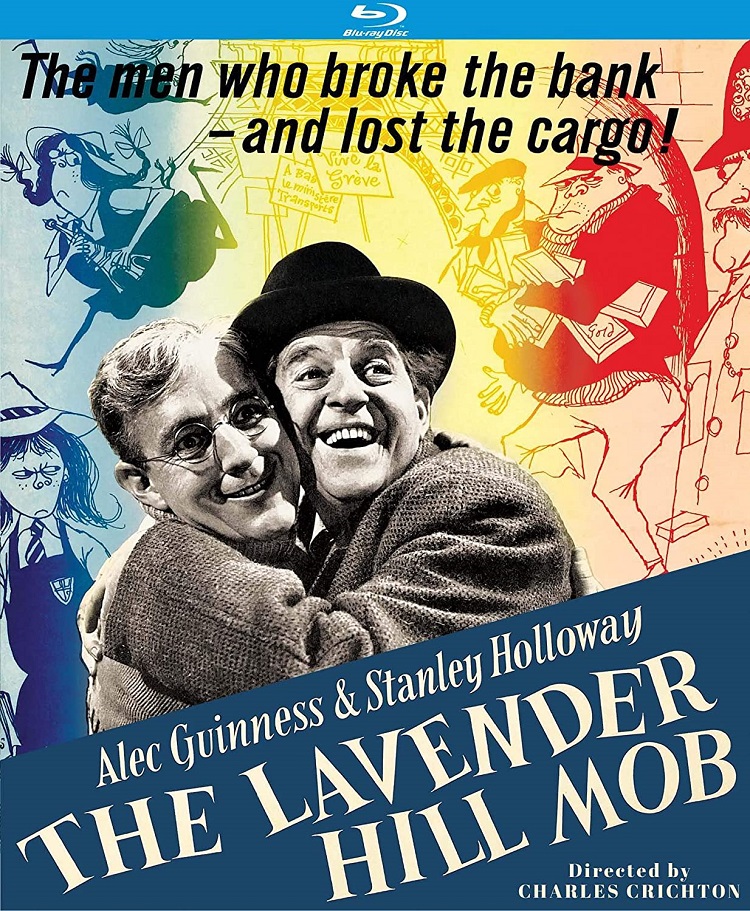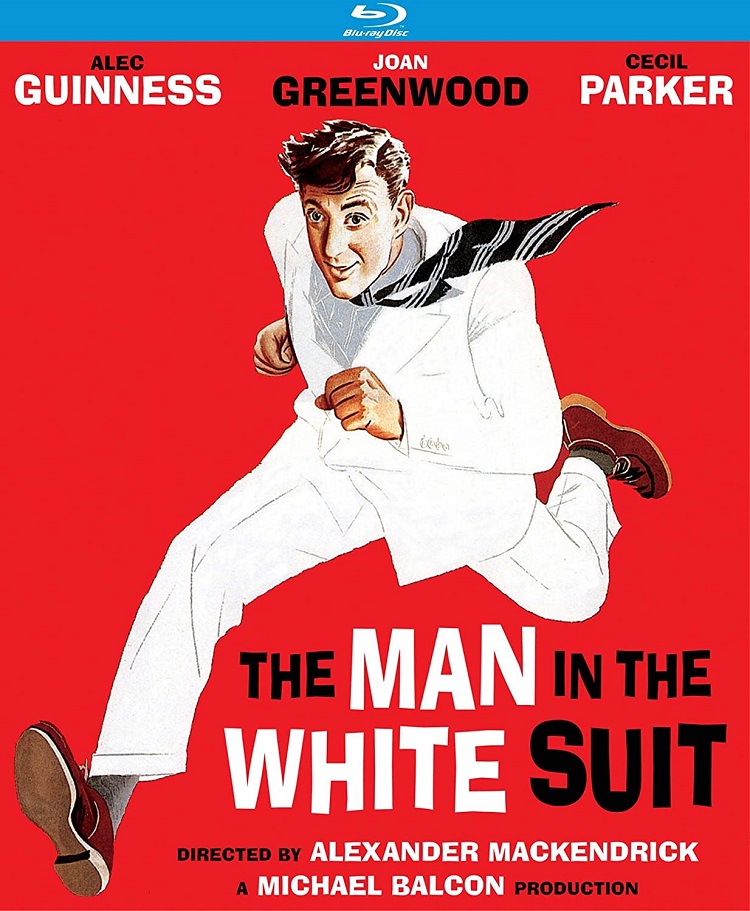
This weekend I caught a Fathom events screening of Lawrence of Arabia. That is a movie made for the big screen and I was thrilled to finally see it in that format. Alec Guinness plays a relatively minor, yet important role in that film and it made me think of his long career. Today, he is probably best known as Obi-Wan Kenobi, the wise old Jedi in Star Wars. After that, he’s likely known for his performances in David Lean epics like the aforementioned Lawrence, or The Bridge on the River Kwai. He is such an impressive dramatic actor it is easy to forget he was once known for his comedies. He starred in several of the best Ealing Comedies (which are considered some of the greatest British comedies ever made), three of which have just been released on Blu-ray by Kino Lorber and two of which I’ll be reviewing here. (Dave Hollingsworth reviewed the third, Kind Hearts and Coronets.)
In The Lavender Hill Mob, Guinness plays Henry Holland, a nebbish, mousy clerk for the Bank of England whose job it is to accompany gold bullion from the foundry to bank. He’s meticulous about it, dotting every “i”, crossing every “t”, and carefully watching traffic to see if anyone is following them. He’s also secretly been plotting to steal as much as his hands can carry at the earliest possible moment. His only stopping point is that selling gold on the English black market is too risky and he’s yet to figure out a way to get it across the border to sell it abroad.
Enter Alfred Pendelbury (Stanley Holloway) who makes trinkets – the sort you find at every touristy gift shot. His biggest seller is a paperweight that looks like the Eiffel Tower which he smelts at his very own foundry. Henry realizes he could use this to turn the gold into Eiffel Towers creating the perfect method to smuggle it out of the country. He easily convinces Pendelbury to help with the scam and they hire two more criminals to complete the job.
Things almost immediately go hilariously awry as everybody on the job bumbles even the simplest of tasks but they miraculously get the gold turned into Eiffel Towers and narrowly smuggle it out of the country. Arriving in Paris, they realize that several of the gold Towers have accidentally been sold to schoolchildren as paperweights and they must hunt them down for fear that someone will discover those souvenirs are literally worth their weight in gold.
The film is a delight from start to finish. It is a light-hearted romp in the very best of ways. It isn’t satirizing anything, there is no deeper meaning to it all, it is just joyful fun. It isn’t so much laugh-out loud hysterical as it is amusingly mirthful throughout. Guinness is perfect and Holloway his perfect match.

The Man in the White Suit is on the opposite end of the comedic spectrum. It is very much a dark satire that has a few moments of slapstick but is mostly plaid straight, garnering its humor in darker places. Guinness plays Sidney Stratton, a quirky but brilliant chemist who so surpasses his superiors in the market of ideas he’s routinely fired. So much so that as the film starts he’s working as a janitor in a textile plant, sneaking into their lab in an effort to make a new kind of fabric – one that will neither tear nor stain. He’s fired from there too but soon enough lands another job at Alan Birnley’s (Cecil Parker) plant and convinces Birnley’s daughter Daphne (Joan Greenwood) that his idea has merit. She talks her father into giving Sidney full reign of the labs. After a few minor setbacks (and numerous explosions), he successfully creates this new fabric and its off to the races.
Birnley is thrilled and seeing many dollar signs in his future, he immediately plans a full-on manufacturing drive. Then he is visited by competing textile manufactures who point out to him that if you make a suit from a fabric that never wears out then there is no need to ever buy a new one, and if no one buys new suits, then they are out of business. The local union gets word of this new fabric and they figure it will put them out of a job. This unholy union between capital and labor forms an alliance bent on stopping Sidney at all costs.For his part, Sidney just wants to help out the common man, giving them a fabric that will save them loads of money and keep them from countless mendings.
It is a deeply cynical film whose comedy springs from dark places. Made in 1951, it perfectly satirizes this moment in English history in which the country was finally coming out of the destruction it met during the war and into a time of unrivaled prosperity. This idea of a fabric that would be both for the benefit of all mankind while simultaneously cause indelible hardship for the same is a fascinating one.
Guinness gives a fine performance playing Sidney Stratton with a hapless gullibility, and the rest of the cast is wonderful. The music, featuring a wonderful bubbling cascade whenever Sidney’s lab is in the frame, is a delight. It has a much more cynical edge than The Lavender Hill Mob making it not nearly as fun to watch, but it has a lot going for it and is a fascinating capsule of the time.
Both films feature audio commentaries from noted film historians plus different interviews and trailers.
Alec Guinness was one of the very best actors. For those of you who only know him from his dramatic work or as Obi-Wan, it is highly recommended that you seek out his comedies. Two of his best have just been released by Kino Lorber Studio Classics and they would make a welcome addition to any collection.